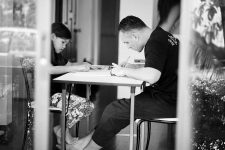By Jennifer Eager
If you’ve ever been scrolling along on Facebook, you may have seen an article or a mention about homeschooling, or a specific mention of a homeschooler who did….whatever they did. Sometimes it’s something fantastic, like win a science fair, write a novel, get into Harvard at the age of 15 or something else that inspires us and makes us think about homeschooling in a positive light. But then there are the horror stories–you know, the homeschooled kid who didn’t have any friends who decided to commit mass murder, or the “homeschooling” parents who kept their kids tied up in the basement, starving them and beating them regularly. I always shake my head at these stories–because, statistically speaking, MOST kids attend school, public or private. Yet when those kids do something horrible, or when they are abused by the people who are supposed to love them most, does anyone ever point out that they go to school?? No, they don’t. Yet somehow, you can bet homeschooling will always be to blame if there is the remotest possibility that it can be.
I propose that homeschooling has nothing to do with it. There are too many factors to get into and this is not a debate about homeschooling versus school. Parents homeschool for many different reasons, and some kids will be successful at homeschooling and some won’t. (The same way some kids are successful in school and some aren’t.) There are so many different ways to homeschool that there simply isn’t a blanket statement to be made about predicting the outcome. Even within the same family, kids have such different personalities that one child might be a model homeschooler, while the next sleeps till noon and seems to spend every waking moment avoiding work. For that matter, there are so many kinds of schools, teachers and students that there is also no way to predict a child’s success or failure in the school system.
However, one thing that most homeschoolers run into is well-meaning (or sometimes argumentative) people who want to know how you plan to turn your kids into functioning adults if they don’t go to school. I used to always respond by saying that I didn’t particularly want the sort of socialization that goes along with school. You know, the kind where older kids would never dream of being friends with younger kids and that the best you could hope for was for the older kids to benevolently ignore and not outright torture the younger ones. The kind where anyone who is the slightest bit different from the pack is teased, ignored, shamed or tormented. The kind where it’s cool to be mean, where your true feelings might require staying hidden for fear of social reprisal, or where you might go along with your friends even though you don’t want to or know it’s wrong.
I would point to my kids as examples. Are they perfect? No, far from it. In fact, there have been times when I’ve wondered if going to school would have been better for them. But one thing my kids definitely have is a relationship with one another that people always notice and comment on. I grew up as one of four children, and I always considered my family happy and our sibling bonds to be strong. We still enjoy spending time together as adults–but we are not and have never been best friends. We all had our own friendships, our own interests and our own lives, and as adults we do not call each other with every little accomplishment or plan vacations together every year, or know the minutiae of one another’s lives.
My kids, on the other hand, are one another’s best friends and closest confidantes. In fact, my three daughters are each 4 years apart (my son is in the middle of the two younger girls) and yet, they spend hours together–reading, drawing, playing music and singing, cooking, playing video games, and talking. My son is often included, although because he is a serious musician he spends a huge portion of his day practicing and won’t abandon his rigid schedule for hanging out. The four of them, along with a couple of outside friends, have a shared language and culture that makes people do a double take on how connected they are, and I have no doubt that this will remain with them always.
But that’s just at your house, the naysayers would whine. I’m talking about socialization–like, who do they see every day besides their own family? People honestly seem to think that homeschoolers live in a box, that they’re never allowed out of the house. I’m going to give just three examples of the ways my homeschoolers have been socialized. Keep in mind that these examples could apply to any homeschooler, or that every homeschooler might have a similar but slightly different example along the same lines.
My first (and favorite) example is community theater. When my kids were small, I would bring them to the local high school’s plays. I had so much fun in my drama clubs growing up, and I minored in theater in college, so I always shared live performances with my kids. They loved watching them, and when they got to the point where I didn’t need to be around the house every second because of nursing (which took a while because I had four kids almost ten years apart) I started volunteering at the box office of our local community theater. One night I brought Rachel with me to help–she was 12 at the time, so the only one who really could be useful–and we struck up a conversation with the lighting designer. He asked Rachel if she’d ever be interested in learning how theater lights worked, and she said yes….this was the beginning of a long, ongoing volunteer opportunity.
With Rachel learning about lighting and being on the schedule for shows, I was doing a lot of driving back and forth and sitting around. As luck would have it, The King and I was about to audition, and they wanted kids. Ben expressed interest–and he won the part of Louis, Anna’s son. To make a long story short, since then our whole family has been onstage, in the lighting booth, on stage crew, stage managing, directing, producing, in the pit orchestra, on the play reading committee, and on the board of our two local community theaters. We have made friends with people of all ages, not just age peers of the kids. They can relate to people who are older, younger, adults, elderly and peers, and they have learned countless lessons abut life, theater, teamwork, disappointment, public speaking, volunteer work, and about an entire spectrum of jobs they never would have seen inside a classroom.
The second example would have to be music. When Ben was 11, he came to me one day and said he’d like to learn how to play the violin. Instantly I thought of horrible, screechy music, bugging him to practice, and a dusty abandoned violin inside of a year that I’d have to figure out what to do with. Money was also on my mind, because I knew music lessons are expensive. Ben had that figured out. He said he wanted to learn via YouTube, where there are all sorts of tutorials, so we went on Amazon and bought a starter violin.
This whole thing makes us laugh now, a bit less than four years later, because Ben now wants to be a concert violinist. It soon became clear that he hadn’t just made an idle comment. I have never reminded him to practice, and even his first attempts at playing were not the stereotypical kid playing where you wildly look around for a way to escape. Within a month or so we’d arranged to have private lessons with a family friend at a rate we could afford…and within a year and a half, that friend was advising us that Ben needed a much better teacher. Music has opened up doors for Ben socially. He has played in chamber ensembles, orchestras, pit orchestras for musicals, at churches, in duets, and solo. He has gone to music camp, he has taught his sisters how to read music. He has learned piano as well, and taught his younger sister the basics of piano until she wanted to take lessons, too. He learned about jazz from a bass player in the pit when I was performing in Dirty Rotten Scoundrels and together they improvised little jazz concerts before each performance. He is entering music competitions and learning German because his goal is to move to Germany to finish high school and attend university. To that end, he has social afternoons with a family we know that spent a year in Germany, and they play games and cook with no English allowed.
Music has also allowed my second daughter, Julia, to come out of her shell. She has always refused to audition for our shows, following her older sister Rachel to the lighting booth. But when Rachel taught herself ukelele, and then taught her sisters, Julia really took to it and started to sing along with it. She made friends with our next door neighbor’s young adult daughter, who loves to sing, and the two of them would spend time, along with Emma, playing and singing and harmonizing. This friend, Cate, knew of a program called Youth Traditional Song Weekend, and she encouraged Julia to apply with her. They both got in and went together to Massachusetts this winter, where they sang with folk singers all weekend, and that has opened the door for other trips and friendships.
The third way homeschooling has allowed my kids to socialize outside of the norm is attendance at semester schools. (I’d never heard of them, either.) One day while I was scrolling through Facebook, a sidebar ad caught my eye. It was for Conserve School, a semester school in Land O’Lakes, Wisconsin, and its motto was: “One Semester Can Make a World of Difference.” I am certain it targeted me as a homeschooler, and this is the reason why I never complain about targeted ads when so many people do! I clicked on the link, and the rest was history, as they say.
A semester school is unique. As a homeschool mom, I’d never want to send my child to school for one semester, because those kids would have a rhythm, they’d have friends and clubs and it would be tough to be the new kid–and with only a semester to fit in, it wouldn’t work. A semester school is different because EVERY kid is new! You literally only attend the school for 4.5 months, along with about 50 other kids. Conserve specializes in environmental science, something my kids are passionate about, but a quick Google search revealed that there are hundreds of semester schools to choose from around the country, specializing in many things.
For us, Conserve was wonderful because it allowed my two older daughters (Ben won’t go because he is too serious about his music to go there, and Emma needs to wait two more years to be old enough to apply) to travel to a different region of the country, live in a supervised yet independent way (like college, in a dorm), make friends that they are still very close to, learn all kinds of special skills they wouldn’t have the opportunity for here on Long Island, such as cross country skiing, ice fishing, working a dog sled, solo camping in 16* weather, and a 55 mile backpacking adventure. Most of all, they were able to see that even though they never sat in a classroom, had homework or took exams, they could thrive in a school setting beautifully. In fact, Rachel didn’t even reveal she was homeschooled when she was at Conserve because another homeschooler in her class there was “weird and gave us a bad name!” Yet, somehow, none of her classmates knew that she hadn’t had the same experiences they had–even down to setting an alarm and getting up at 6am, something that she certainly never did at home. It gave them confidence, a taste of independence and a sense of just how much the world has to offer, and I am forever grateful that they went there.
These are just some of the ways my kids have been able to interact with the world that they wouldn’t have been able to had they been sitting in public school their whole lives. They have become friends with people of all ages and from different backgrounds. They have grown as people because they have been allowed to do things differently. Now, of course, there have been some things they’ve missed out on. They didn’t have the constant companionship of peers the way you do as a school kid. They missed out on some clubs and sports teams and fun things like Music in the Parks and being part of the crowd…and sometimes I wish they could have had those things too. But the way I look at it, there is good and bad that comes with each choice we make, and the difference is that parents of kids who go to school tend not to think about it because they are doing what’s expected of them. Their kids are obviously socialized exactly the way they should be, so there’s no reason to second guess. Parents who make the choice to homeschool have it harder because they chose to be different and, therefore, they chose to make their children different.
I think that we are conditioned to believe that different is worse…but in actuality, I don’t believe it is. I think that sometimes, my kids have felt outside what people expect, but by and large, I think they enjoy the differences. They love the freedom we have always had to explore and play and draw and create. They have always loved sleeping in and not running out early on frosty mornings to wait for a school bus. They have always loved being able to study by the fire, or make hot cocoa in the afternoons, or read sitting in a tree, or scrapping work to go to the beach on the first truly gorgeous day in spring. They’ve always pointed out how much fun we have, and they love that they have never felt tied down by homework and reading lists and the length of a school day because for us, the school day has only ever been as long as we needed it to be to get work done. I think that the relationships they have made and the experiences they’ve had are going to serve them well in the long run, and that anyone asking the Big S Question after meeting them would wonder why they ever asked in the first place.






